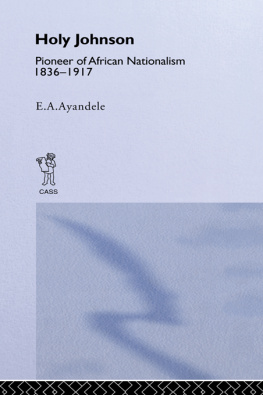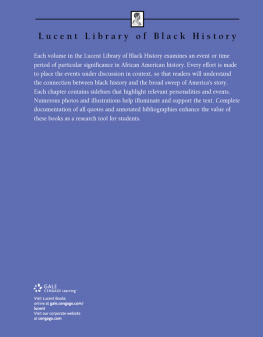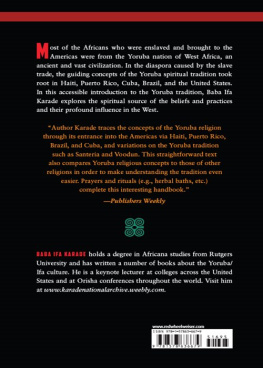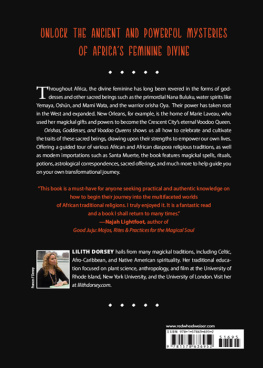Yoruba Traditions and African American Religious Nationalism
A Volume in the Religions of the Americas Series
Sacred Spaces and Religious Traditions in Oriente Cuba by Jualynne E. Dodson
Louis Riel and the Creation of Modern Canada: Mythic Discourse and the Postcolonial State by Jennifer Reid
Strange Jeremiahs: Civil Religion and the Literary Imaginations of Jonathan Edwards, Herman Melville, and W. E. B. Du Bois by Carole Lynn Stewart
Shrines and Miraculous Images: Religious Life in Mexico Before the Reforma by William B. Taylor
Marvels and Miracles in Late Colonial Mexico: Three Texts in Context by William B. Taylor
Editors: Davd Carrasco and Charles H. Long
Frontispiece: Handwritten spiritual prescriptions by Oseijeman Adefunmi following a divination reading for a supplicant in 1972. Photograph courtesy of Djisovi Ikukomi Eason and Lillian Ashcraft-Eason.
Yoruba Traditions & African American Religious Nationalism
Tracey E. Hucks
Foreword by Charles H. Long
University of New Mexico Press | Albuquerque
ISBN for this digital edition: 978-0-8263-5077-0
2012 by the University of New Mexico Press
All rights reserved. Published 2012
Printed in the United States of America
The Library of Congress has cataloged the printed edition as follows:
Hucks, Tracey E., 1965
Yoruba traditions and African American religious nationalism / Tracey E. Hucks; foreword by Charles H. Long.
pages cm. (Religions of the Americas)
Includes bibliographical references and index.
ISBN 978-0-8263-5075-6 (cloth : alk. paper) ISBN 978-0-8263-5077-0 (electronic)
1. Orisha religionUnited StatesHistory. 2. African AmericansReligionHistory. 3. Black nationalismUnited StatesHistory. 4. Adefunmi, Oseijeman, 19282005. 5. Oyotunji African Village (S.C.)History.
I. Title.
BL2532.S5H83 2012
299.683330973dc23
2011047655
To my parents
My mother, Doretha Leary Hucks (19361984),
my first teacher in life
My father, Joseph Richard Hucks,
the High Priest in my life
As co-creators, you will forever remain
the strongest leaves of my tree
Pray to the Gods who are not White, who are not Western, for your Life, for your Brothers Life.
James Baldwin
Foreword
This text contains two interrelated and overlapping travel narratives. One of the narratives is in the form of a travel in timethe history of ideas, meanings, symbols, and images of Africa in African American culture; this narrative contextualizes the second one. The second narrative tells the story of a young African American male from Detroit, Walter Eugene King, and his journey from Detroit through a variety of times, spaces, and imaginations to his emergence as Oba Efuntola Oseijeman Adefumi I in the new space of the Oyotunji Yoruba Village in South Carolina. It is in fact this story that evoked the necessity for the larger historical narrative that encompasses it.
Both narratives are concerned with the image and symbol of Africa as a religious orientation. The first narrative traverses historical time, describing and explaining the meaning of Africa in the life and culture of black folk and especially in African American nationalist ideology. Because the narratives are concerned with religious quests, we are immediately reminded of the religious rite of pilgrimage. The encompassing historical narrative takes us through the passages of time, space, actions, and thought of persons and communities of African Americans from their initial enslavement in North America to the present. Within this fulsome narrative we are made aware of the significance, power, and necessity of a place to be called home for millions of persons of African descent who were separated from their original homeland and denied authenticity as human beings in North America. The continent of Africa, their place of origin, was remembered, invented, symbolized, and remade within the new spaces and times of North America as a foundation for their humanness as well as a vision for a viable human future.
The prominence of religious journeys in this study brings to mind the religious rite of pilgrimage, especially in the research of Victor Turner. The quest of the young Walter Eugene King, which takes him from Detroit to New York, Haiti, Europe, Africa, and Cuba, corresponds to the liminal phase of the pilgrimage phenomenon as described by Turner. The liminal phase of the pilgrimage is that period between the pilgrims departure from home and familiar circumstances until the arrival at the sacred site that is the goal of the pilgrimage. Turner analyses the new social relations and identities that are formed during this phase and time. In addition, during the liminal period tensions, contrasts, and critique of the reigning social order come to the fore. Victor Turners other pertinent term of analysis, the notion of communitas , fits well with the kind of knowledges of Africa and the various practioners of African-derived religions King met and consulted with during his pilgrimage and the founding of Oyotunji Village in South Carolina as what Turner might have referred to as a normative mode of communitas.
Now while this text is a biography of Walter Eugene Kings bildungsroman as a religious pilgrimage, it is much more than this. It is at the same time a descriptive and critical history of African American nationalism as a religious phenomenon. It shows how the image and symbol of Africa became the basis for an alternate authenticity for the communities of African Americans in North America. From this discussion we are confronted with the broader issue of the meaning of religion in the contemporary world. The text employs a variety of methods ranging from ethnohistory, history, history of religions, and political science. In so doing, the issue of theory and method in the disciplines of religious studies is raised. Tracey Hucks as the narrator and author of the biography of Walter Eugene King/Oseijeman Adefumi I and the interwoven narratives of African American nationalism suggests a hermeneutical position that parallels the role of a novelist. This novelistic tonality refers us back again to the thematic and stylistics of religious pilgrimagepilgrimage as the sources of knowledge that combines both the larger context of the history of African American nationalism and the biography of Walter Eugene King. Such a procedure in method is reminiscent of an older meaning of pilgrimage as not only the visit to sacred sites, but equally pilgrimage as the mode for the acquisition of knowledgepilgrimage as theoria .
It is at this juncture that we should remember that our word theory is from a Greek term that means spectacleseeing, sight. Seeing here refers to knowledge and knowing. Echoes of this older meaning were revived by Michel Foucault when he introduced the term gaze as a mode of knowing. Theory as sight refers to a meaning it had in the fourth century BCE in Greece. It did not, however, imply the abstracting domineering gaze of scientific technology made popular by Foucault, but it is rather more closely related to what Clifford Geertz, the anthropologist, has called thick description.
Andrea Wilson Nightingale has recently explored the hermeneutical, religious, and philosophical meaning of theoria in Greek thought and culture. At one place she describes the pilgrimage structure of theory: When directed towards a religious sanctuary or festival, theoria took the form of a pilgrimage in which the theoros departed from his city or hometown, journeyed to a religious sanctuary, witnessed spectacles and events, participated in rituals, and returned home to ordinary civic life. This description fits the pilgrimage of the young Walter Eugene King almost perfectly. There is an added dimension when we understand the context of the body of knowledge that evoked his pilgrimage, on the one hand, and how the theoros (pilgrim) journey enhanced the meaning of this body of knowledge.






